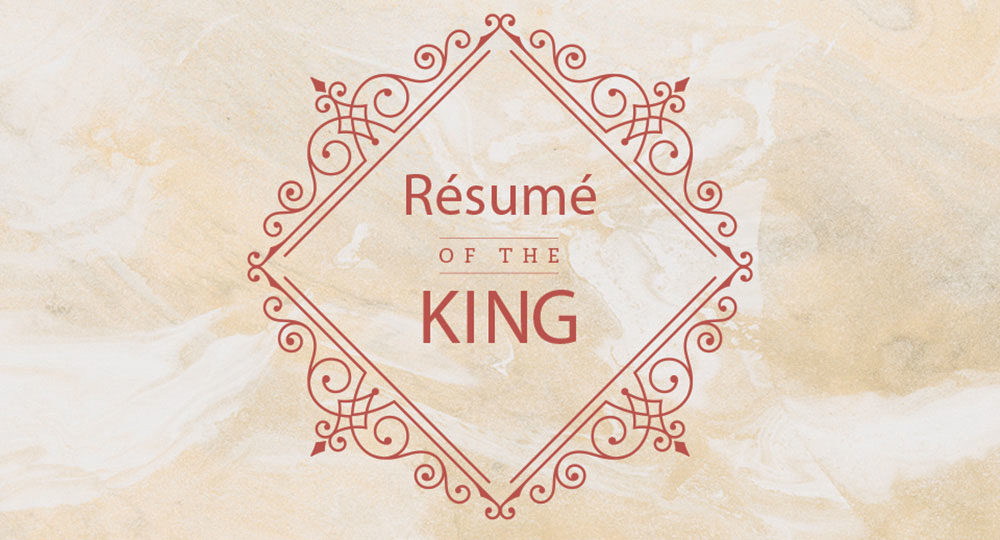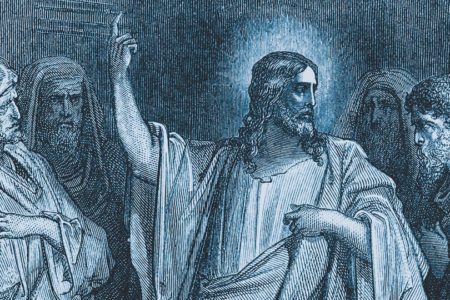Résumé of the King
Moses said, “You shall surely set a king over you whom the Lᴏʀᴅ your God chooses” (Dt. 17:15). Here is how God planned to administer His kingship authority over Israel.
It is rarely in people’s natures to want what God wants for them. Often we want things that have no eternal value or that might even hurt us. Other times, we may want the right things but at the wrong time and for the wrong reason, much like Israel did when it demanded a king.
Israel wanted a human ruler so it could be “like all the nations” (1 Sam. 8:5). But God did not want His Chosen People to be like the pagans because He was their King. In his distress, the prophet Samuel went to the Lord: “And the Lᴏʀᴅ said to Samuel,…‘They have rejected Me, that I should not reign over them’” (v. 7).
God had intended for the Israelites to have a king eventually (Gen. 49:10; Dt. 17:14–20), but not then and not for their reason.
By divine design, He chose to administer His kingship authority mediatorially: The king was to rule on God’s behalf, and God was to be Israel’s true Sovereign: “The Lᴏʀᴅ shall reign forever and ever” (Ex. 15:18).
THE FEASTS OF ISRAEL
Want to know more about Rosh Hashanah and other Jewish holidays? Check out The Feasts of Israel by Bruce Scott.
In fact, Israel’s two-day celebration of the Feast of Trumpets presents God as King. This feast today is referred to as Rosh Hashanah, which means “head of the year.” For some Orthodox Jewish groups, the Feast of Trumpets’ fundamental theme is God’s coronation as Hamelech, “the King” (cf. Ps. 93:1).
According to tradition, the blowing of the shofar (ram’s horn) at Rosh Hashanah signals the beginning of the 10 days of repentance, when people usually fear God’s judgment. However, the rabbis believed that viewing the feast as a coronation would replace fear with adoration for God’s grandeur as King.
During Temple times, the blowing of trumpets was accompanied by the recitation of 10 kingship verses of Scripture. Some people sang 10 kingly psalms of David. Others read the Ten Commandments, while still others favored reciting from the book of Genesis the 10 words God spoke during creation. Whatever route people chose, the point was to acknowledge God’s authority as the only true, majestic King (cf. Talmud, Rosh Hashanah 32a).
God’s kingship over Israel is still highlighted in the current traditional Hebrew blessing, “Blessed art Thou O Lord our God, King of the universe.”
When the time was right, God planned to administer His kingship authority through a representative (Dt. 17:14–20). He provided specific qualifications and guidelines for the man who was to hold this high and powerful office:
- He was to be an Israelite (v. 15).
- He was not to create a large military by amassing horses (v. 16).
- He was not to amass wives (v. 17).
- He was not to amass a large personal fortune (v. 17).
- He was to write out personally a copy of the Law of God (v. 18).
- He was to read the Law throughout his lifetime(vv. 19–20).
- He was never to make the people return to Egypt (v. 16).
According to Egyptologists, the pharaohs saw themselves as divine and received worship as the incarnation of Egypt’s creator sun-god, Ra.
The Israelites, however, were to worship only the true God, the Creator and King of kings, who delivered them from slavery in Egypt; and their kings were to see themselves as His human representatives, as King David did:
O Lᴏʀᴅ, there is none like You, nor is there any God besides You, according to all that we have heard with our ears. And who is like Your people Israel, the one nation on the earth whom God went to redeem for Himself as a people—to make for Yourself a name by great and awesome deeds, by driving out nations from before Your people whom You redeemed from Egypt? For You have made Your people Israel Your very own people forever; and You, Lᴏʀᴅ, have become their God (1 Chr. 17:20–22).
Prior to David, Israel’s foray into the realm of human kingship did not go well. Saul, from the tribe of Benjamin, started well but ended in failure. Then God chose young David from the tribe of Judah, “a man after His own heart” (1 Sam. 13:14; cf. Acts 13:22). With David He made a covenant that is in effect to this day: “And your house and your kingdom shall be established forever before you. Your throne shall be established forever” (2 Sam. 7:16).
Israelite kings came and went. Some were good; most were bad. But the Davidic Covenant remained.
Hundreds of years prior to David’s birth, God had designated Judah as the royal tribe. In ancient Egypt, the patriarch Jacob, whose name God changed to Israel (Gen. 32:28), gathered his 12 sons to his deathbed for their final blessings. When Jacob’s eyes rested on his son Judah, he saw in Israel’s future a specific King to come: “The scepter shall not depart from Judah, nor a lawgiver from between his feet, until Shiloh comes; and to Him shall be the obedience of the people” (49:10).
An ancient Aramaic paraphrase puts it this way: “He who exercised dominion shall not pass away from the house of Judah, nor the scribe from his children’s children forever, until Messiah shall come. Whose is the kingdom, and whom the peoples shall obey” (Targum of Onkelos). Jacob had prophesied about the coming King-Messiah and His Kingdom.
The word Shiloh means “the one who brings rest or peace.” It expresses the belief that the King will bring tranquility to His people. The scepter represents authority.
The fulfillment of Jacob’s prophecy began with the anointing of King David (1 Sam. 16:13). Ultimately, it will be fulfilled with Jesus. He is the King, the God-Man, and the Son of David who will sit on Israel’s throne forever. As the angel Gabriel told His mother, Mary, “He will be great, and will be called the Son of the Highest; and the Lord God will give Him the throne of His father David” (Lk. 1:32).
When Jesus first came to Earth, He was viewed as a king: “Where is He who has been born King of the Jews? For we have seen His star in the East and have come to worship Him” (Mt. 2:2).
When He rode into Jerusalem on a colt on Palm Sunday, fulfilling the prophecy of Zechariah 9:9, the multitude joyfully acknowledged His kingship: “Blessed is the King who comes in the name of the Lord! Peace in heaven and glory in the highest!” (Lk. 19:38).
And when He was nailed to the tree, “an inscription also was written over Him in letters of Greek, Latin, and Hebrew: THIS IS THE KING OF THE JEWS” (23:38).
Today Israel still waits for its Davidic King. When the time is right, “the Son of Man [will come] in His glory, and all the holy angels with Him, then He will sit on the throne of His glory” (Mt. 25:31).
The ancient rabbis taught, “At the end, the very end of days, Gog and Magog and their armies shall go up against Jerusalem, but they shall fall by the hand of the King Messiah” (Targum Yerushalmi II on Numbers 11:26).
When He returns to rescue Israel, the world will recognize Him instantly: “He has on His robe and on His thigh a name written: KING OF KINGS AND LORD OF LORDS” (Rev. 19:16).
Then Israel will have its final and divine King; and “of the increase of His government and peace there will be no end, upon the throne of David and over His kingdom, to order it and establish it with judgment and justice from that time forward, even forever” (Isa. 9:7).









Your message has warmed my heart.
Thank you Peter